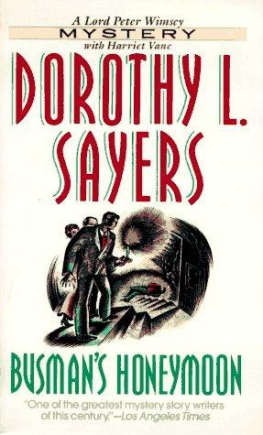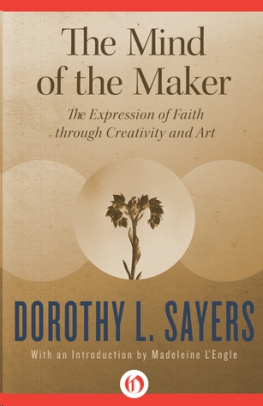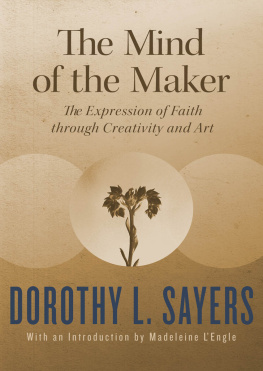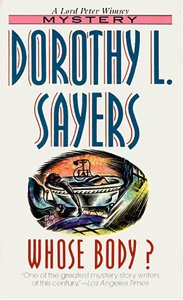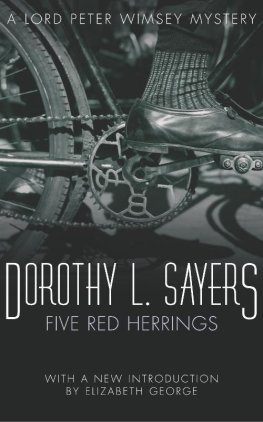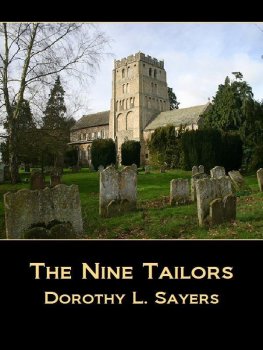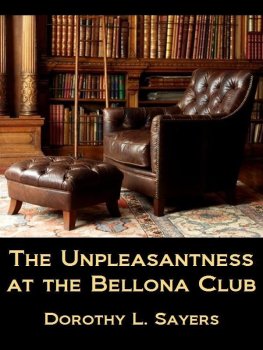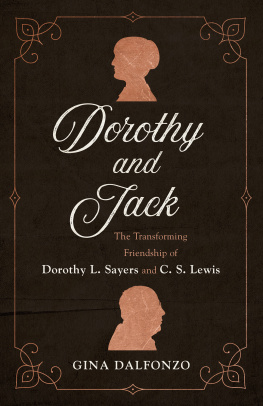DOROTHY L. SAYERS - WHOSE BODY? (CRIME CLUB S.)
Here you can read online DOROTHY L. SAYERS - WHOSE BODY? (CRIME CLUB S.) full text of the book (entire story) in english for free. Download pdf and epub, get meaning, cover and reviews about this ebook. year: 1989, publisher: HODDER STOUGHTON LTD, genre: Detective and thriller. Description of the work, (preface) as well as reviews are available. Best literature library LitArk.com created for fans of good reading and offers a wide selection of genres:
Romance novel
Science fiction
Adventure
Detective
Science
History
Home and family
Prose
Art
Politics
Computer
Non-fiction
Religion
Business
Children
Humor
Choose a favorite category and find really read worthwhile books. Enjoy immersion in the world of imagination, feel the emotions of the characters or learn something new for yourself, make an fascinating discovery.

- Book:WHOSE BODY? (CRIME CLUB S.)
- Author:
- Publisher:HODDER STOUGHTON LTD
- Genre:
- Year:1989
- Rating:4 / 5
- Favourites:Add to favourites
- Your mark:
- 80
- 1
- 2
- 3
- 4
- 5
WHOSE BODY? (CRIME CLUB S.): summary, description and annotation
We offer to read an annotation, description, summary or preface (depends on what the author of the book "WHOSE BODY? (CRIME CLUB S.)" wrote himself). If you haven't found the necessary information about the book — write in the comments, we will try to find it.
WHOSE BODY? (CRIME CLUB S.) — read online for free the complete book (whole text) full work
Below is the text of the book, divided by pages. System saving the place of the last page read, allows you to conveniently read the book "WHOSE BODY? (CRIME CLUB S.)" online for free, without having to search again every time where you left off. Put a bookmark, and you can go to the page where you finished reading at any time.
Font size:
Interval:
Bookmark:

 Dorothy L Sayers
Dorothy L Sayers
Oxford-educated Dorothy Leigh Sayers (1893-1957) was one of the most popular authors of the Golden Age era. Born in England in 1893, Dorothy Sayers received her degree at university in medieval literature. Following her graduation, besides publishing two volumes of poetry, she began to write detective stories to earn money.
Her first novel, "Whose Body?" (1923), introduced Lord Peter Wimsey, the character for which she is best known. Wimsey, with his signature monocle and somewhat foppish air, appeared in eleven novels and several short stories. Working with his friend, Inspector Parker of Scotland Yard, Wimsey solved cases usually involving relatives or close friends.
Dorothy L. Sayers was well known for "combining detective writing with expert novelistic writing," and the imaginative ways in which her victims were disposed of. Among the many causes of death seen in her novels were, among others, poisoned teeth fillings, a cat with poisoned claws, and a dagger made of ice! (The Whodunit)
Dorothy Sayers also edited several mystery anthologies collected under the heading "The Omnibus of Crime" (1929), which included a noteworthy opening essay on the history of the mystery genre.
Later on in her life, Dorothy Sayers gave up detective fiction to pursue her other interests. She spent the last years of her life working on an English translation of Dante's Divine Comedy, having always claimed that religion and medieval studies were subjects more worthy of her time than writing detective stories
BOOKS BY DOROTHY L. SAYERS
THE NINE TAILORS
HANGMAN'S HOLIDAY
MURDER MUST ADVERTISE
HAVE HIS CARCASE
THE FIVE RED HERRINGS
STRONG POISON
LORD PETER VIEWS THE BODY
THE UNPLEASANTNESS AT THE BELLONA CLUB
THE DOCUMENTS IN THE CASE (In collaboration with Robert Eustace)
UNNATURAL DEATH
CLOUDS OF WITNESS
GAUDY NIGHT
BUSMAN'S HONEYMOON
IN THE TEETH OF THE EVIDENCE
by
THIS RE-ISSUE OF
WHOSE BODY?
DOROTHY L. SAYERS
(which has received some corrections and amendments from Miss Sayers ) has for a Preface a short biography of Lord Peter Wimsey, brought up to date (May 1935) and communicated by his uncle P AUL A USTIN D ELAGARDIE .
WIMSEY, P ETER D EATH B REDON, D.S.O. ; born 1890, 2nd son of Mortimer Gerald Bredon Wimsey, 15th Duke of Denver, and of Honoria Lucasta, daughter of Francis Delagardie of Bellingham Manor, Hants.
Educated: Eton College and Balliol College, Oxford (1st class honours, Sch. of Mod. Hist. 1912); served with H.M. Forces 1914/18 (Major, Rifle Brigade). Author of: Notes on the Collecting of Incunabula, The Murderer's Vade-Mecum, etc.
Recreations: Criminology; bibliophily; music; cricket.
Clubs: Marlborough; Egotists'. Residences: 110 a Piccadilly, W.; Bredon Hall, Duke's Denver, Norfolk.
Arms: Sable, 3 mice courant, argent; crest, a domestic cat couched as to spring, proper; motto: As my Whimsy takes me.
Communicated by PAUL AUSTIN DELAGARDIE
I am asked by Miss Sayers to fill up certain lacun and correct a few trifling errors of fact in her account of my nephew Peter's career. I shall do so with pleasure. To appear publicly in print is every man's ambition, and by acting as a kind of running footman to my nephew's triumph I shall only be showing a modesty suitable to my advanced age.
The Wimsey family is an ancient onetoo ancient, if you ask me. The only sensible thing Peter's father ever did was to ally his exhausted stock with the vigorous French-English strain of the Delagardies. Even so, my nephew Gerald (the present Duke of Denver) is nothing but a beef-witted English squire, and my niece Mary was flighty and foolish enough till she married a policeman and settled down. Peter, I am glad to say, takes after his mother and me. True, he is all nerves and nosebut that is better than being all brawn and no brains like his father and brothers, or a mere bundle of emotions, like Gerald's boy, Saint-George. He has at least inherited the Delagardie brains, by way of safeguard to the unfortunate Wimsey temperament.
Peter was born in 1890. His mother was being very much worried at the time by her husband's behaviour (Denver was always tiresome, though the big scandal did not break out till the Jubilee year), and her anxieties may have affected the boy. He was a colourless shrimp of a child, very restless and mischievous, and always much too sharp for his age. He had nothing of Gerald's robust physical beauty, but he developed what I can best call a kind of bodily cleverness, more skill than strength. He had a quick eye for a ball and beautiful hands for a horse. He had the devil's own pluck, too: the intelligent sort of pluck that sees the risk before it takes it. He suffered badly from nightmares as a child. To his father's consternation he grew up with a passion for books and music.
His early school-days were not happy. He was a fastidious child, and I suppose it was natural that his school-fellows should call him Flimsy and treat him as a kind of comic turn. And he might, in sheer self-protection, have accepted the position and degenerated into a mere licensed buffoon, if some games-master at Eton had not discovered that he was a brilliant natural cricketer. After that, of course, all his eccentricities were accepted as wit, and Gerald underwent the salutary shock of seeing his despised younger brother become a bigger personality than himself. By the time he reached the Sixth Form, Peter had contrived to become the fashionathlete, scholar, arbiter elegantiarumnec pluribus impar. Cricket had a great deal to do with itplenty of Eton men will remember the Great Flim and his performance against Harrowbut I take credit to myself for introducing him to a good tailor, showing him the way about Town, and teaching him to distinguish good wine from bad. Denver bothered little about himhe had too many entanglements of his own and in addition was taken up with Gerald, who by this time was making a prize fool of himself at Oxford. As a matter of fact Peter never got on with his father, he was a ruthless young critic of the paternal misdemeanours, and his sympathy for his mother had a destructive effect upon his sense of humour.
Denver, needless to say, was the last person to tolerate his own failings in his offspring. It cost him a good deal of money to extricate Gerald from the Oxford affair, and he was willing enough to turn his other son over to me. Indeed at the age of seventeen, Peter came to me of his own accord. He was old for his age and exceedingly reasonable, and I treated him as a man of the world. I established him in trustworthy hands in Paris, instructing him to keep his affairs upon a sound business footing and to see that they terminated with goodwill on both sides and generosity on his. He fully justified my confidence. I believe that no woman has ever found cause to complain of Peter's treatment; and two at least of them have since married royalty (rather obscure royalties, I admit, but royalty of a sort). Here again, I insist upon my due share of the credit; however good the material one has to work upon it is ridiculous to leave any young man's social education to chance.
The Peter of this period was really charming, very frank, modest and well-mannered, with a pretty, lively wit. In 1909 he went up with a scholarship to read History at Balliol, and here, I must confess, he became rather intolerable. The world was at his feet, and he began to give himself airs. He acquired affectations, an exaggerated Oxford manner and a monocle, and aired his opinions a good deal, both in and out of the Union, though I will do him the justice to say that he never attempted to patronise his mother or me. He was in his second year when Denver broke his neck out hunting and Gerald succeeded to the title. Gerald showed more sense of responsibility than I had expected in dealing with the estate; his worst mistake was to marry his cousin Helen, a scrawny, over-bred prude, all county from head to heel. She and Peter loathed each other cordially; but he could always take refuge with his mother at the Dower House.
Font size:
Interval:
Bookmark:
Similar books «WHOSE BODY? (CRIME CLUB S.)»
Look at similar books to WHOSE BODY? (CRIME CLUB S.). We have selected literature similar in name and meaning in the hope of providing readers with more options to find new, interesting, not yet read works.
Discussion, reviews of the book WHOSE BODY? (CRIME CLUB S.) and just readers' own opinions. Leave your comments, write what you think about the work, its meaning or the main characters. Specify what exactly you liked and what you didn't like, and why you think so.

